中考英语语法专项复习语态精讲精练打印讲义学霸笔记
中考英语语法专项复习句子种类精讲精练打印讲义学霸笔记
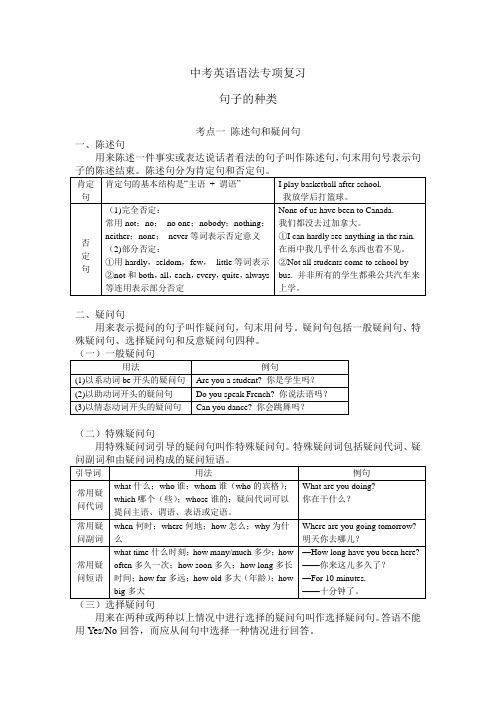
中考英语语法专项复习句子的种类考点一陈述句和疑问句一、陈述句用来陈述一件事实或表达说话者看法的句子叫作陈述句,句末用句号表示句二、疑问句用来表示提问的句子叫作疑问句,句末用问号。
疑问句包括一般疑问句、特殊疑问句、选择疑问句和反意疑问句四种。
(二)特殊疑问句用特殊疑问词引导的疑问句叫作特殊疑问句。
特殊疑问词包括疑问代词、疑用来在两种或两种以上情况中进行选择的疑问句叫作选择疑问句。
答语不能用Yes/No回答,而应从问句中选择一种情况进行回答。
(四)反意疑问句附在陈述句后对陈述内容进行反问的句子叫作反意疑问句,也叫附加疑问句。
反意疑问句前一部分是陈述句,后一部分是简短问句。
陈述部分用逗号结尾,反问部分用问号结尾。
例如:It’s a nice day, isn’t it?天气不错,不是吗?1. 基本结构:前肯后否;前否后肯。
例如:①We have talked abou t it, haven’t we?我们已经谈过这件事了,不是吗?②Mr. Smith isn’t at home, is he?陈述句是I think/I suppose/I believe/I consider等结构时,问句一般与从句保持一致。
注意“否定前移”。
①I th ink you can do it better next time, can’t you?我觉得你下次可以做得更好,是不是?②I don’t believe there will be robots at people’s homes, will there?我相信人们的家里不会有机器人的,会有吗?【巧学妙记】感叹句,并不难,what或how摆在前。
强调名词用what,其余how很简单。
名词若是可数单,前带冠词a或an。
主语谓语放在后,省略也是很常见。
考点三祈使句祈使句表达说话人对对方的劝告、叮嘱、建议、请求或命令等。
主语you通常省略,谓语动词用原形,句末用感叹号或句号。
初中英语学霸完整笔记

初中英语学霸完整笔记英语是一门非常重要的学科,对于初中生来说,掌握好英语知识不仅能提高自己的学习能力,还能为将来的发展打下坚实的基础。
为了帮助初中生们成为英语学霸,下面将为大家提供一份完整的英语笔记,帮助大家系统地学习英语知识。
一、基础词汇1. 名词:名词是指人、事物、地方、动物等的名称。
可以根据名词的单数、复数、所有格等进行分类。
2. 动词:动词是指表示动作、状态或存在的词语。
根据动词的不同形式,可以分为不规则动词和规则动词。
3. 形容词:形容词是用来描述名词的词语,表示事物的性质、状态、特征等。
形容词的比较级和最高级形式可以用来比较事物的差异和优劣。
4. 副词:副词是用来修饰动词、形容词、副词等的词语,表示时间、地点、程度、方式等。
副词可以通过在词尾加-ly来构成。
二、语法知识1. 时态:英语中有现在时、过去时、将来时等不同的时态。
根据不同的句子结构和语境,选择正确的时态非常重要。
2. 句型:英语中有简单句、并列句、复合句等不同的句型。
要学会使用不同的句型,使自己的表达更加丰富和准确。
3. 语态:英语中有主动语态和被动语态。
要学会转换句子的语态,能够灵活运用被动语态进行表达。
4. 从句:从句是句子中的一个独立成分,它可以作为名词、形容词或副词的修饰语。
要学会识别从句,并理解从句与主句的关系。
三、阅读技巧1. 阅读理解:在做阅读理解题时,要先仔细阅读文章,了解文章的大意。
然后,根据问题,有针对性地查找答案,避免被干扰项误导。
2. 词汇猜测:在阅读过程中,遇到不认识的单词时,可以根据上下文的意思来猜测单词的意思。
通过积累词汇和理解词汇的词义延伸,提高自己的词汇猜测能力。
3. 阅读技巧:阅读时要注意细节,抓住重点信息。
可以使用划线、做笔记等方法来帮助理解和记忆文章的内容。
四、写作技巧1. 写作结构:写作时要有明确的结构,包括引言、主体和结论。
主体部分要有清晰的逻辑结构和合理的段落划分。
2. 词汇和句型:写作时要使用丰富的词汇和多样的句型,使文章更加生动、有趣和有说服力。
中考英语语法专项复习副词精讲精练打印讲义学霸笔记
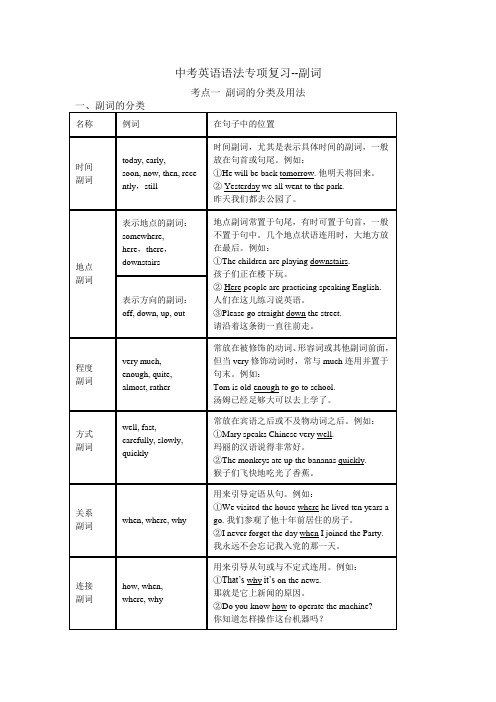
中考英语语法专项复习--副词考点一副词的分类及用法形容词变为副词1. 一般直接加-ly:quick―quickly; bad―badly2. 个别以e结尾的去e加-ly:true―truly3. 以y结尾且发音为[i]的把y变为i再加-ly;若读音为[ ],则直接加-ly:happy―happily; heavy―heavily;angry―angrily; shy―shyly; dry―dryly4. 结尾是辅音字母加le的形容词去e加y:terrible―terribly; possible―possibly; probable―probably二、副词的用法1. 作状语(1)用来修饰形容词、副词,通常放在所修饰词之前(enough放在所修饰形容词的后面)①The girl is really clever .这个女孩确实聪明。
②Yao Ming is tall enough to touch the basket.姚明足够高能够触到篮筐。
(2)副词修饰动词时,一般放在被修饰词之后;very,quite不能修饰动词;方式副词放在句尾Kobe plays basketball very well .科比打篮球非常好。
(3)位于句首,修饰整个句子Luckily, he was not hurt badly.幸运的是,他伤得不重。
2. 作定语一般放在所修饰词之后The people here are very friendly. 这儿的人很友好。
3. 作表语放在系动词之后I must be off now.现在我必须走了。
考点二副词的比较等级1. 一般副词在词前加more/most变为比较级/最高级。
clearly —more clearly—most clearly;easily—more easily—most easily2. 少数既可作形容词也可作副词的在词尾加-er/-est。
hard—harder—hardest; fast—faster—fastest3. 副词比较等级的使用类似于形容词的比较等级用法,但副词最高级前一般不用定冠词the。
初中英语九年级学霸笔记

初中英语九年级学霸笔记
以下是一份初中英语九年级的学霸笔记,供您参考:
1. 词汇和短语
掌握常用的动词、名词、形容词和副词等词汇,如“develop”,“culture”,“successful”,“enthusiastic”等。
熟记常用的短语和习惯表达,如“make a difference”,“keep up with”等。
2. 语法
掌握简单句、复合句和并列句的构成和用法,以及各种时态和语态的用法。
了解虚拟语气、非谓语动词和定语从句等高级语法知识。
3. 阅读理解
提高阅读速度和理解能力,掌握常用的阅读技巧,如略读、跳读和细读等。
积累阅读中遇到的生词和短语,提高词汇量。
4. 写作
学习写作技巧,如开头、结尾、段落展开和语言表达等。
多写多练,积累常用的写作模板和句型,提高写作水平。
5. 听力
提高听力理解能力,掌握常用的听力技巧,如预测答案、定位关键信息和
筛选无关信息等。
多听英语材料,如新闻、电影、电视剧和公开课等,提高英语语感。
6. 口语
提高口语表达能力,学习常用的口语表达方式和流利度。
多参加英语角、口语练习伙伴等英语交流活动,提高口语实际应用能力。
总之,初中英语九年级的学霸笔记应该包括词汇和短语、语法、阅读理解、写作、听力和口语等方面的内容。
通过不断的学习和实践,可以提高英语水平。
中考英语语法专项复习非谓语动词精讲精练打印讲义学霸笔记

中考英语语法专项复习精讲精练非谓语动词一、定义不充当句子谓语的动词叫做非谓语动词。
它们不受主语限制,无时态与语态变化,又称非限定性动词。
二、形式1. 动词不定式(to do sth. )2. 动名词(v. -ing)3.分词现在分词(v. -ing) 过去分词(v. -ed或不规则变化)考点一动词不定式动词不定式可作主语、表语、宾语、定语、状语和宾语补足语,我们主要掌握不此外,不定式可以与疑问词连用, 用作主语、宾语、表语等。
①I can’t decide which one to buy.我不能决定该买哪一件。
(作宾语)②When to start hasn’t been discussed.什么时候开始还没有被讨论。
(作主语)【温馨提示】(1)help后接不定式时可以省略to;(2)有些动词后接不定式时通常省略to:feel, hear, see, watch, notice, let, make, have(简记为一感一听三看三让)。
上述动词变为被动语态后,其后的不定式必须补上“to”。
①Tom helped his brother (to) learn to swim.汤姆帮他的弟弟学习游泳。
变为被动语态:His brother was helped to learn to swim by Tom.②We often hear Jack sing English songs.我们常听见杰克唱英文歌。
变为被动语态:Jack is often heard to sing English songs.【巧学妙记】只能跟不定式作宾语的动词决心学会有希望(decide, determine, learn, wish, hope),同意计划莫假装(agree, plan, pretend),胆敢拒绝会失败(dare, refuse, fail),准备设法来帮忙(prepare, try, manage, help),提供请求负担起(offer, beg, demand, afford),答应安排理应当(promise, arrange, be supposed),以上后跟不定式,劝君牢记永不忘。
初三英语时态总结学霸笔记
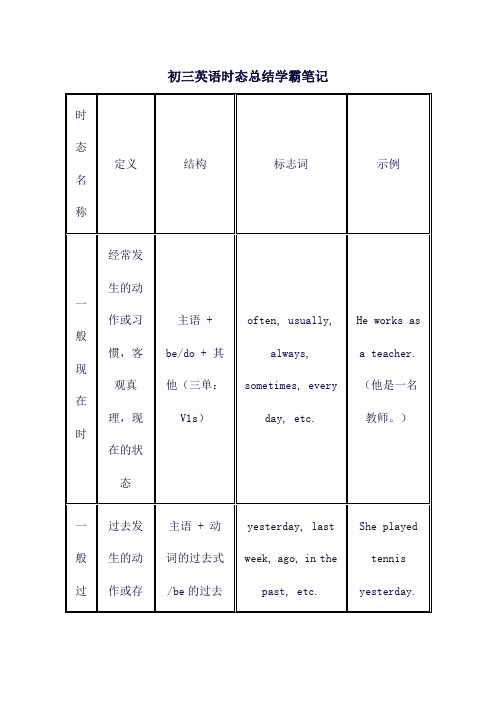
过去将来时
从过去某时间看来将要发生的动作
主语 + would + do,或主语 + was/were going to + do
the next day, the following week, etc.(常用于宾语从句中)
I have already finished my homework. (我已经完成了我的作业。)
过去完成时
在过去某一时间之前已经完成的动作(即“过去的过去”)
主语 + had + 过去分词
before, by the time, until, etc.(常用于复合句中)
By the time he arrived, the train had already left. (当他到达时,火车已经开走了。)
He said he would come to visit me next week. (他说他下周会来看我。)
现在完成时
过去发生且对现在有影响的动作,或持续到现在的动作
主语 + have/has + 过去分词
already, just, yet, ever, never, recently, for+时间段, since+时间点, etc.
初三英语时态总结学霸笔记
时态名称
定义
结构
标志词
示例
一般现在时
经常发生的动作或习惯,客观真理,现在的状态
主语 + be/do + 其他(三单:V1s)
often, usually, always, sometimes, every day, etc.
第十一章动词的语态(思维导图+知识梳理+好题精炼)2022-2023初中英语中考语法归纳
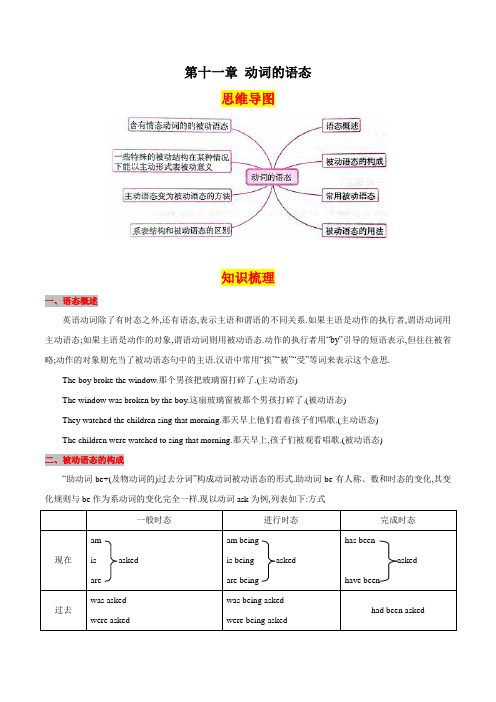
第十一章动词的语态思维导图知识梳理一、语态概述英语动词除了有时态之外,还有语态,表示主语和谓语的不同关系.如果主语是动作的执行者,谓语动词用主动语态;如果主语是动作的对象,谓语动词则用被动语态.动作的执行者用“by”引导的短语表示,但往往被省略;动作的对象则充当了被动语态句中的主语.汉语中常用“挨”“被”“受”等词来表示这个意思.The boy broke the window.那个男孩把玻璃窗打碎了.(主动语态)The window was broken by the boy.这扇玻璃窗被那个男孩打碎了.(被动语态)They watched the children sing that morning.那天早上他们看着孩子们唱歌.(主动语态)The children were watched to sing that morning.那天早上,孩子们被观看唱歌.(被动语态)二、被动语态的构成“助动词be+(及物动词的)过去分词”构成动词被动语态的形式.助动词be有人称、数和时态的变化,其变化规则与be作为系动词的变化完全一样.现以动词ask为例,列表如下:方式三、常用被动语态(一)一般现在时This kind of TV set is made in Guangzhou.这种电视是广州制造的.Chinese is spoken by the largest number of people in the world.汉语是世界上最多人讲的语言.(二)一般过去时The thief was arrested.小偷被抓住了.These pictures were taken on the Great Wall.这些照片是在长城拍摄的.(三)一般将来时Your watch will be repaired.你的表将会被修理好.The class meeting will be held next Saturday afternoon.班会下周六下午召开.(四)现在进行时A new road is being built outside my house.我们家门口正在修一条新路.The watch is being repaired.这只表正在修理.(五)过去进行时The bridge was being repaired when we passed it.我们过桥时,桥正在修.While the supper was being prepared, the light suddenly went out.正在做晚饭时,电灯突然灭了.(六)过去将来时They decided that invitations would not be sent out unless they were carefully checked.他们决定除非经过仔细校对,否则请柬不会发送出去.(七)现在完成时Your wallet has been found.你的钱夹已经找到了.Enough has been said here of this question.关于这个问题,这里已经谈得不少了.(八)过去完成时By 1972 a cooperative medical system had been set up in this area.到1972年这个地区已建立了合作医疗制度.When the anthem had been played, the Congress began.奏完国歌后,大会开始.四、被动语态的用法(一)不知道谁是动作的执行者,用被动语态My watch was stolen.我的手表被窃了.This jacket is made of cotton.这件夹克是棉制的.Her son was killed in World War II.她的儿子在第二次世界大战中战死.(二)没有必要或不想指出谁是动作的执行者,用被动语态The children have been very well looked after.孩子们得到很好的照顾.A big building has been put up in my home town.我家乡已经建起一座大楼.Many thousands of trees must be planted every year.每年必须种很多树.This hat was made in China.这顶帽子是中国制作的.The bicycles must not be put here.这儿不准放车.(三)强调或突出动作的承受者时,用被动语态The letter was posted.信发了.She was asked to sing a song.她被要求唱支歌.He cannot be relied on.他不可靠.A liar is looked down upon.说谎的人被人看不起.(四)出于礼貌措辞等原因不愿说出动作的执行者Anyone who sees the lion is asked to telephone the zoo and the police.有谁看见这只狮子,请给动物园和警方打电话.You are wished to do it more carefully.希望你认真一点做.(五)为使句子结构简练、紧凑,上下连贯,也即出于行文的需要When he was still a young man, he was forced to leave his home land for political reasons.他年轻时,就由于政治原因被迫离开了祖国.Lenin often talked to his comrades and was always listened to attentively.列宁经常和同志们谈话,同志们总是留心听他说.(六)在文章标题、广告、新闻等中常用省略助动词be的被动语态Telephone call placed.(TCP)电话接通了.(省略了has been)Girls Wanted.招女工.(广告用语,省略了are)Road Blocked.道路堵塞.(新闻报道,省略了is)五、含有情态动词的被动语态情态动词的被动语态,其结构是:情态动词+be+过去分词.Young trees cannot be cut down.小树不可以砍伐.The exercises must be done in class.练习必须在课堂上做.This dictionary must be taken good care of.这本词典必须保管好.The time in class must be made good use of.上课的时间必须好好地利用.六、主动形式表示被动意(一)某些由及物动词转化来的不及物动词read, write, clean, wash, iron, burn, draw, cook, keep, cut, open, blow, peel, sell, act等,常和副词well, easily, smoothly等连用,且通常用主动结构表示被动含义.The pen writes well.这支笔很好写.(二)动词need, require, want, deserve, be worth 后接v.-ing的主动结构常表被动含义This film is really worth seeing.这部电影的确值得看.The car needs cleaning.这辆汽车需要清扫了.(三)有些动词如:cook, print, do等,常用主动结构的进行时表被动含义The lunch is cooking.午饭正在烧.(四)某些系动词如feel, prove, smell, taste, sound等加上形容词,也可用主动语态表示被动意义.如:The food tastes delicious.这食物味道很美.七、主动语态变为被动语态的方法把主动语态的结构变为被动语态结构时,要做如下的变动:(一)主动结构的宾语变为被动结构的主语(二)主动结构的谓语动词由主动语态变为被动语态结构的谓语动词(be+动词的过去分词)(三)主动结构的主语变为介词“by”的宾语,组成介词短语,放在被动结构中谓语动词之后.若动作的执行者无须说明或不必强调时,by组成的短语就可以省略(四)主动语态变被动语态时,时态要保持一致(五)含有直接宾语和间接宾语的主动结构,变为被动结构时,可以将其中一个宾语变为被动语态的主语,另一个不动.一般是将主动结构的间接宾语变为被动结构的主语,这样句子显得自然一些Books and newspapers in the reading room mustn't be taken away.阅览室的书和报纸都不能带走.This kind of bike is not made in our factory.这种自行车不是我们厂生产的.This picture can't have been drawn by him.这张画不可能是他画的.When was that book published?那本书是什么时候出版的?Shall we be asked to attend the opening ceremony?会邀请我们参加开幕式吗?点拨(1)带双宾语的谓语动词变为被动语态时,既可以将间接宾语转化成主语,也可以将直接宾语转化成主语.若将间接宾语转化成主语,则保留直接宾语;若将直接宾语转化成主语,则保留间接宾语,且在被保留的间接宾语前加上介词to或for.常见的能接双宾语(直接宾语和间接宾语)的词有:give, show, bring, lend, send(送,寄)等,这些词与介词to 搭配.还有buy, make, draw(画画)等,这些词与介词for搭配.We gave them some books.我们给了他们一些书.They were given some books.(变间接宾语为主语)Some books were given(to)them.(变直接宾语为主语)(2)含有宾语补足语的句子,宾语变为主语后,宾语补足语改为主语补足语,原来的位置一般不变.但如果宾语补足语是不带to的动词不定式,句子变成被动语态后则要加to,以便将两个动词隔开.We keep food cold in the fridge. =→Food is kept cold in the fridge.我们用电冰箱保鲜食品.Every day the tiger makes one of the smaller animals bring him something to eat.=→Every day one of the smaller animals was made to bring the tiger something to eat.老虎每天强迫一个小动物给他带吃的东西来.(3)短语动词的被动语态短语动词在主动结构中是一个不可分割的词组,在被动结构中也是如此,不可丢掉后面的介词或副词.The nurse takes good care of the children.阿姨很好地照顾小孩.The children are taken good care of by the nurse.孩子们受到保姆很好的照顾.八、系表结构和被动语态的区别(一)系表结构通常只用于一般现在时或一般过去时,而被动结构可用于多种时态(二)系表结构中的过去分词常常有其固定的介词搭配,被动结构则没有(三)系表结构中的过去分词可被very等副词修饰;被动结构中的过去分词可用much修饰.比较:The husband was very agitated about his wife's health.丈夫为他妻子的健康状况深感不安.(系表结构)Milk ,meat, eggs and vegetables are produced in the farm.这个农场盛产牛奶、肉,鸡蛋和各种蔬菜.(被动结构)They were asked to speak at the meeting.他们被邀请在会议上讲话.(被动结构)He was puzzled about it.他为那件事感到困惑.(系表结构)九、不能使用被动语态的情况(一)某些表示状态的及物动词作谓语时常见的表示状态的及物动词有have(有),fit(适合),suit(适合),hold(容纳),cost(花费)等.The room can hold 100 people.这个房间能容纳100人.(二)宾语是反身代词或相互代词、表示地点或处所的名词时,不可用于被动语态在黑暗中我们几乎看不到对方.We could hardly see each other in the dark.(✓)Each other could hardly be seen in the dark.(x)(三)宾语是不定式短语或动名词时汤姆喜欢听音乐.Tom enjoys listening to music.(✓)Listening to music is enjoyed by Tom. (x)好题精练一、将下列句子变为被动语态1.Everybody respects the brave old man.____________________________________________________________________________________________ 2.We elected Comrade Li head of our workshop.____________________________________________________________________________________________ 3.She can translate the difficult sentence into English.____________________________________________________________________________________________ 4.We are turning China into a powerful industrial country.____________________________________________________________________________________________ 5.They asked her to tell a story.____________________________________________________________________________________________ 答案:1.The brave old man is respected by everybody.rade Li was elected head of our workshop(by us).3.The difficult sentence can be translated into English by her.4.China is being turned into a powerful industrial country(by us).5.She was asked to tell a story.二、将下列句子变成主动语态1.We were told an interesting story by our teacher yesterday afternoon.____________________________________________________________________________________________ 2.A kite is being made(by us) now.____________________________________________________________________________________________ 3.What was said by you at the meeting?____________________________________________________________________________________________ 4.Our homework must be finished first.____________________________________________________________________________________________ 5.A hole should be dug for the young tree.____________________________________________________________________________________________ 6.Will the trees be watered every day?____________________________________________________________________________________________ 答案:1.Our teacher told us an interesting story yesterday afternoon.2.We are making a kite now.3.What did you say at the meeting?4.We must finish our homework first.5.We should dig a hole for the young tree.6.Shall we water the trees every day?三、选择填空1.The lost boy_________ this early morning.A. foundB. was foundC. is foundD. are found2.That factory_________ in 1970.A. builtB. was builtC. is builtD. were built3.This medicine_________ before dinner.A. should have tookB. ought have takenC. should have been eatenD. should have been taken4.When the speaker entered the hall, all the listeners_________.A. had seatedB. were seatedC. seatedD. were seating5.Many trees_________ in spring every year.A. plantB. plantedC. are plantedD. be planted6.The People's Republic of China_________ on Oct.1,1949.A. was foundingB. was foundedC. was foundD. finded7.Our classroom_________ every day.A. cleansB. be cleanedC. cleanedD. is cleaned8.A radio_________ in everyday life.A. useB. is usedC. are usedD. was used9.Children in China_________ since 1949.A. are taken good careB. have taken care ofC. took good care ofD. have been taken good care of10.The patient is well_________.A. took care ofB. taken care ofC. taken careD. take care of11.The room was_________ smoke.A. filled withB. filledC. fill withD. is filled with12.His new book_________ next month.A. will be publishedB. is publishingC. is being publishedD. has been published13.The sun_________ at night as usual.A. can be seenB. can't be seenC. can't seeD. doesn't see14.A strange sound_________ last night.A. was heardB. hearsC. heardD. is heard15.The door_________. Better have it repaired.A. isn't shutB. hasn't been shutC. isn't be shutD. won't shut答案:1-5BBDBC 6-10BDBDB 11-15 AABAD四、翻译下列句子1.应该在春天种树.____________________________________________________________________________________________ 2.我的家乡将要建造许多大楼.____________________________________________________________________________________________ 3.教室必须每天清扫.____________________________________________________________________________________________ 4.这种书是为儿童写的.____________________________________________________________________________________________ 5.来信收到.____________________________________________________________________________________________ 6.这件外衣是棉的还是羊毛的?____________________________________________________________________________________________ 7.你的收音机三天内可以修好.8.黑板上的那匹马不可能是林涛画的.____________________________________________________________________________________________ 答案:1.Trees should be planted in spring.2.Many buildings will be built in my home town.3.The classroom must be cleaned every day.4.Such books are written for children.5.Your letter has been received.6.Is this coat made of cotton or wool?7.Your radio can be mended within three days.8.The hore on the blackboard can't be drawn by Lin Tao.。
中考英语语法专项复习情态动词精讲精练打印讲义学霸笔记
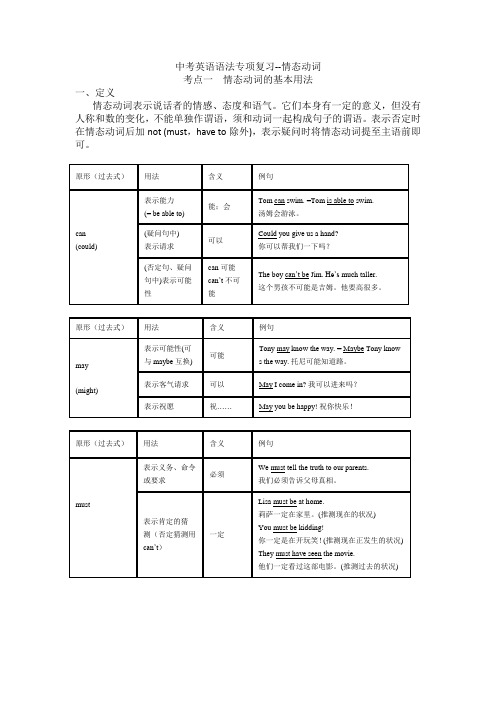
中考英语语法专项复习--情态动词考点一情态动词的基本用法一、定义情态动词表示说话者的情感、态度和语气。
它们本身有一定的意义,但没有人称和数的变化,不能单独作谓语,须和动词一起构成句子的谓语。
表示否定时在情态动词后加not (must,have to除外),表示疑问时将情态动词提至主语前即可。
(1)情态动词的过去式表示比原形更委婉的语气。
(2)mustn’t表示否定意义“禁止,不允许”。
可与祈使句互换。
例如:You mustn’t play football in the street.你不准在街道上踢足球。
(=Don’t play football in the street. )(3)have to有人称、数和时态的变化,表示受客观条件限制,意为“不得不”。
例如:She has to take the bus to work.她不得不坐公交车去上班。
(4)May. . . ? 句式的否定回答:No, . . . mustn’t/can’t.Must. . . ? 句式的否定回答:No, . . . needn’t.①—May I smoke here? ——我可以在这儿吸烟吗?—No, you mustn’t . ——不,你不准。
②—Must I go now? ——我必须现在走吗?—No, you needn’t .——不,你没必要。
(5)must,should,may,might都可以表示“可以”,可能性程度由大到小依次为:must﹥should﹥may﹥might。
考点二易混情态动词1. must & can’t两者都表示推测,can’t意为“不可能”,must意为“一定”;句中一般会有说明推测理由的附属从句。
例如:―The girl in red must be Jenny. She often wears a red skirt to school. ——那个穿红衣服的女孩一定是珍妮。
完整word版学霸初中三年精华英语笔记
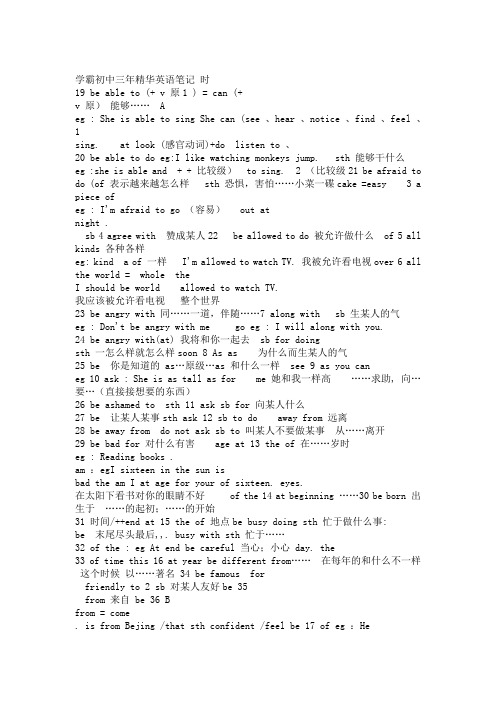
学霸初中三年精华英语笔记时19 be able to (+ v 原1 ) = can (+v 原)能够…… Aeg : She is able to sing She can (see 、hear 、notice 、find 、feel 、1sing. at look (感官动词)+do listen to 、20 be able to do eg:I like watching monkeys jump. sth 能够干什么eg :she is able and + + 比较级) to sing. 2 (比较级21 be afraid to do (of 表示越来越怎么样 sth 恐惧,害怕……小菜一碟cake =easy 3 a piece ofeg : I'm afraid to go (容易) out atnight .sb 4 agree with 赞成某人22 be allowed to do 被允许做什么 of 5 all kinds 各种各样eg: kind a of 一样 I'm allowed to watch TV. 我被允许看电视over 6 all the world = whole theI should be world allowed to watch TV.我应该被允许看电视整个世界23 be angry with 同……一道,伴随……7 along with sb 生某人的气eg : Don't be angry with me go eg : I will along with you.24 be angry with(at) 我将和你一起去 sb for doingsth 一怎么样就怎么样soon 8 As as 为什么而生某人的气25 be 你是知道的 as…原级…as 和什么一样 see 9 as you caneg 10 ask : She is as tall as for me 她和我一样高……求助, 向…要…(直接接想要的东西)26 be ashamed to sth 11 ask sb for 向某人什么27 be 让某人某事sth ask 12 sb to do away from 远离28 be away from do not ask sb to 叫某人不要做某事从……离开29 be bad for 对什么有害 age at 13 the of 在……岁时eg : Reading books .am :egI sixteen in the sun isbad the am I at age for your of sixteen. eyes.在太阳下看书对你的眼睛不好 of the 14 at beginning ……30 be born 出生于……的起初;……的开始31 时间/++end at 15 the of 地点be busy doing sth 忙于做什么事:be 末尾尽头最后,,. busy with sth 忙于……32 of the : eg At end be careful 当心;小心 day. the33 of time this 16 at year be different from……在每年的和什么不一样这个时候以……著名 34 be famous forfriendly to 2 sb 对某人友好be 35from 来自 be 36 Bfrom = come. is from Bejing /that sth confident /feel be 17 of eg :He. from Bejing He 从句clause +comes? Bejing Is 自信,对什么有信心/感觉 he from? my confident feel / I : eg am of come from Bejing he DoesI English spoken装满……的 full can I that feel 37 be of充满be test. pass the filled with.water of full is glass The eg: 将来2 现在进行时1 :doing + be 18 The glass is filled with water . 62 be strict with sb 对某人要求严格eg: Some students are not strict 38 be glad+to+do/从句with themselves.39 be going to + v(原)将来时有些学生对自己不严格63 be strict with sb in well 40 be good at(+doing) = do in sth 某方面在某方面善长, 善于……对某人严格64 be supposed to do for 对什么有好处被要求干什么 41 be good65 be sure 表确定 eg : Reading aloud is good for66 be sure of doing sth 对做某事有 your English.信心be happy to do 很高兴做某事 42eg: He is 对某人有好处43 be helpful to sb sure of winning I am sure of learning English well. to eg : Reading aloud is helpful67 be sure of sth 对做某事有信心 you .eg: I'm sure of Exercising ishelpful to your my head /myteacher. bady . 我相信我的大脑(老师)68 be 44 be in good health 身体健康 sure that sth 对做某事有信心eg: I'm suer that he can pass the 45 be in trouble 处于困难中test. eg trouble. She is in :69 be sure in 对某方面感兴趣 to do sth一定会做某事 be 46 interested eg: late late 47 be for = come to 迟We are sure to pass the test.我们一定会通过这次考试到Weare 上课迟到Be eg: late for class sure to learn English well. 我们一定能学好英语像……48 be like70 be terrified of + 名/动doing 害mother like : eg I'm my怕……49 生某人的气be mad at71 be terrified to do 由……制成from be 50 made (制成以sth 害怕做某事后看不见原材料)72 be the same (be 51 made of 由……制成制成以后还看as …和什么一样73 be used to doing 得见原材料) sth 习惯做某事eg: My father sure be 52 not 表不确定 is used to gettingup early. to a 53 be on visit 参观我爸爸习惯早起。
2024年中考英语学霸必刷子母题第12讲 语态(一般现在时、一般过去时、一般将来时)(原卷版)

专题一语法知识语法知语法知识识第12讲语态要点归纳思维导图考向及母题典例被动语态考向高频考点实用解题口诀考向1 一般现在时的被动语态考向2 一般过去时的被动语态考向3 一般将来时的被动语态高频考点:被动语态的时态变化被动语态解题口诀:be变done不变,be随时态变,动词过分变。
被动语态各时态构成:结论:be变done不变,be随时态变,动词过分变。
(一般现在时、一般过去时、一般将来时三种时态的被动语态为中考考核内容)口诀解题典例::Many trees and flowers______in our school last year and they made our school a beautiful garden.A. have plantedB.are plantedC. were plantedD.will be planted口诀识别题目中需要对被动语态的不同时态进行区分时,用此口诀解题。
口诀解题答案解析根据题干中的last year并结合大招“be随时态变”可知,此处用一般过去时的被动语态,故选C。
解题坑点学生判断时态时容易失误,需要注意be要根据时态和主语的单复数而发生变化。
时态变化有时不一定有明显的标志词,需要根据具体语境判断。
(2023·江苏徐州·中考真题)The Monkey King is a traditional Chinese character. It ________ by people of all ages.A.is loved B.was loved C.will love D.is loving【答案】A【详解】句意:孙悟空是中国的一个传统人物。
它受到所有年龄段的人的喜爱。
考查被动语态及动词时态。
根据“by”可知,此处是被动语态,指孙悟空被人们喜爱。
本句陈述事实,故为一般现在时。
故选A。
母题2(2023·四川乐山·统考中考真题)—Who’s the little girl in the photo?—It’s me. The photo ________ when I was five years old.A.took B.was taken C.is taken【答案】B【详解】句意:——照片里的小女孩是谁?——是我。
中考英语语法笔记整理大全03版(K12教育文档)

中考英语语法笔记整理大全03版(word版可编辑修改)编辑整理:尊敬的读者朋友们:这里是精品文档编辑中心,本文档内容是由我和我的同事精心编辑整理后发布的,发布之前我们对文中内容进行仔细校对,但是难免会有疏漏的地方,但是任然希望(中考英语语法笔记整理大全03版(word版可编辑修改))的内容能够给您的工作和学习带来便利。
同时也真诚的希望收到您的建议和反馈,这将是我们进步的源泉,前进的动力。
本文可编辑可修改,如果觉得对您有帮助请收藏以便随时查阅,最后祝您生活愉快业绩进步,以下为中考英语语法笔记整理大全03版(word版可编辑修改)的全部内容。
中考英语语法笔记整理大全名词表示人、事物、地方、现象或抽象概念等的名称的词.注:1。
专有名词是指人、地方、团体、机构等特有的名称。
第一个字母必须大写。
专有名词前一般不加冠词。
2、有普通名词构成的专有名词前要用定冠词“the”,但它不大写。
3、有些不可数名词有时表示为具体的东西时,则变为可数名词,而且以四上也有了变化。
eg。
beer ———-a beer 一杯啤酒, work--- a work 工厂,著作,glass--—a glass 一个玻璃杯, room空间--—a room一个房间二、名词的数:表示可以计算数目的人或物称为可数名词。
1、可数名词有单、复数两种形式:可数名词的单数形式要在名词前加“a或an";复数形式是在名词后加“-s或—es"。
名词复数形式有规则变化和不规则变化两种,规则变化及其读音2。
可数名词复数的不规则变化①改变单数名词中的元音字母eg。
man--men,woman—women,tooth—teeth, foot—feet, goose—geese,mouse——mice②单复数同形 eg。
Chinese-Chinese, deer—deer, fish-fish, sheep-sheep,…③由man 和woman构成的合成词, 每个名词都要变复数eg. a man doctor— men doctors, a woman teacher——women teachers 注意:有些名词表示一种物体具有不可分割的相同的两部分,在使用时只有复数形式eg。
中考英语语法专项复习动词与时态精讲精练打印讲义学霸笔记

中考英语语法专项复习--动词及时态动词短语常见以下六种类型:1. 动词+介词,宾语位于介词后。
例如:look for; listen to; talk about/with; think about2. 动词+副词,代词作宾语时须用“动词+代词+副词”形式;名词作宾语可以在副词前,也可在副词后。
例如:turn on/off/ up/down; pick up; call up; take out3. 动词+副词+介词,宾语位于介词后。
例如:come up with; run out of; get on/along with4. 动词+名词+介词,宾语在介词后;名词前可以加形容词限定。
例如:take (good) care of; take pride in; pay (more) attention to5. 动词+名词(后无宾语)。
例如:take place; lose heart6. be+形容词+介词,形容词前可加程度副词。
如very等。
例如:be proud of; be angry with; be interested in考点二动词的时态二、时态的应用及动词变化形式1. 一般现在时【巧学妙记】学习一般现在时,基本用法要熟悉。
表示动作常发生,特征性格和能力。
存在状态和习惯,客观事实与真理。
如果主语是单三,谓语就要变一变。
2. 一般过去时(1)一般过去时的用法①表示过去某个特定时间发生的动作或存在的状态。
通常与yesterday, last year, in 1976, a few months ago等表示过去的时间状语连用。
例如:I met him in the street yesterday.昨天我在街上遇到他了。
②表示过去某一段时间内经常或反复发生的动作。
通常与often, usually, seldom等表示频度的副词连用,但这种用法是以一个过去时间为前提的。
例如:He often went to school by bus last term.上学期他经常乘公共汽车去上学。
中考英语 语法专题讲义
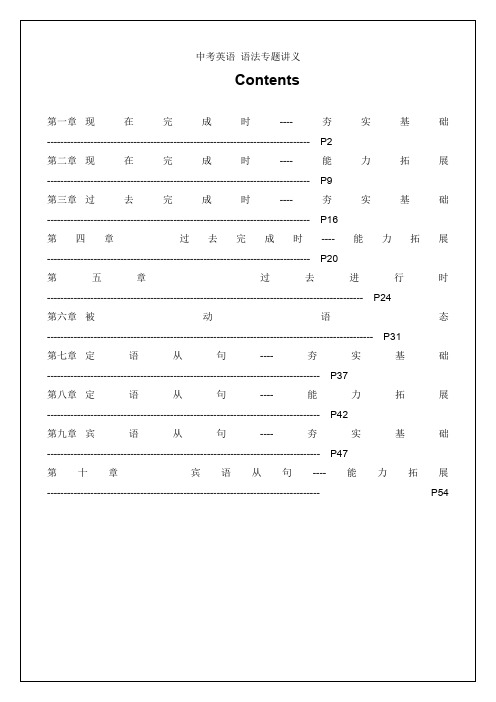
HomeworkHomework第四章过去完成时---能力拓展第五章过去进行时---基础夯实第七章定语从句---基础夯实ideas and feeling freely.【甘肃】A. whichB. whoC. whose D /4.Yesterday Li Ming went to the village_________ his family lived ten years ago.【山东德州】A. whenB. whichC. whereD. that5. I like the cartoon ______ has a happy ending and makes me ______. 【广东梅州】A. which; to laughB. that; to laughC. whose; laughingD. which; laugh6. —Look! That is the woman I met yesterday.【广东湛江】—Oh? She’s my aunt.A. whatB. whoC. whereD. when7.She is the girl invention got the first prize in the school competition .【湖北荆州】A.who B.that C.which D. whose8.—Do you know of Guo Mingyi?【哈尔滨】—Yes. He is an ordinary(普通的)worker ______ helps many poor children in China. We shouldfollow his example.A. thatB. whichC. whom9.The man_________is talking to our teacher is Betty’s father.【山东潍坊】A. whichB. whomC. whoD. what10.It’s bad for health to hurry to move into a house ________ has new furniture in it.A. whoB. whereC. that11.Teenagers like reading the books _____ are written by Guo Jingjing.【湖北孝感】A. whoB. whatC. whoseD. that12. —Why is Tom so sad?【福建泉州】—He has lost his new bike _______cost him 1800 yuan.A. whoB. whichC. whose第八章定语从句---能力拓展10.This is the only one of the students _____ the truth.A.that knows B.that know C.who know D.which knows11.The old man _____ yesterday is a scientist.A.I spoke B.I spoke toC.whom I spoke D.that I spoke to him12. The young man _____ is an engineer of our factory.A.that you just talked B.whom you just talked toC.which you just talked to D.who you just talkedThe dictionary _____ is sold out in the bookshop.A.you need B.what you needC.which you need it D.that you need it14. This is the factory _____ we visited last week.A.which B.where C.who D.in which15. He has to work on Sundays,_____ he does not like.A.and which B.which C.and when D.when16.Mr. Smith will pay a visit to Beijing this autumn, __ we will enjoy the Olympic Games in 2008.A. whereB. whenC. whichD. How17.He stayed there for quite a long time, during ________ time he learned much spoken English.A. thatB. thisC. whichD. same中考链接:1. The house________ Lu Xun used to live is now a museum. 【内蒙古】A. whichB. thatC. in whichD. there2. The Palace Museum is the best place _________ I’ve ever visited.【湖北十堰】A. thatB. whichC. where`D. What3.I love the school I have studied in for three years【湖南】A. whereB. whenC. that4. People are talking about the old houses _ Jackie Chan bought in Anhui twenty years ago.【四川】A. whic hB. whereC. whoD. when5. Being blind is something _________ most people can’t imagine.【浙江】A. whoB. whatC. thatD. Whom6.—Look! That is the woman I met yesterday.【广东】—Oh? She’s my aunt.A.whatB. whoC. whereD. When7.Yesterday Li Ming went to the village_________ his family lived ten years ago.【山东德州】A. whenB. whichC. whereD. that8. I still remember the college and the teachers____________I visited in London years ago.【安徽】A. whatB. whoC. thatD. which9.The first thing _____ my brother is going to do this afternoon is to write a letter.【广东】A. whichB. thatC. whyD. who10.Li Mei is the student _________ handwriting is the b est in our class.【铜仁】A. whoseB. whomC. whoD. that。
2021年中考英语语法专项讲义附练习

(26套全)中考英语语法专项讲义附练习(史上最全的中考语法讲义)被动语态知识精讲一、被动语态语态是动词的一种形式,表示主语和谓语动词之间的具体关系,分为主动语态和被动语态两种。
主动语态表示主语是谓语动词所表示的动作的执行者。
被动语态表示主语是谓语动词所表示的动作的承受者。
被动语态是动词的一种特殊形式,一般来说,只有需要动作对象的及物动词才有被动语态。
汉语往往用“被、受、给”等被动词来表示被动意义。
其结构是由“助动词be+及物动词的过去分词done”构成的。
be本身无词义,但有时态、人称和数的变化,其变化与时态中的变化一致。
各种时态的被动语态结构表(以动词do为例):二、被动语态的用法1. 不知道或没有必要指出谁是动作的执行者时。
例:The bridge was built last year. 这座桥是去年建造的。
He was elected chairman. 他被选为主席。
2. 当更加强调动作的承受者时。
此时动作的执行者由by引导置于谓语动词之后,不需要时可以省略。
例:The room hasn’t been cleaned yet. 房间还没有打扫。
The tiger was killed by him. 老虎被他杀死了。
3. 当动作的执行者不是人时,多用被动语态。
例:The window was blown by wind. 窗户被风吹开了。
The whole village has been washed away by the flood. 整个村庄都被洪水冲走了。
三点剖析一、考点:被动语态的句子结构和用法。
二、重难点:谓语动词的主动形式表示被动意义:1. 英语中有很多动词如break,catch,clean,drive,lock,open,sell,read,write,wash等,当它们被用作不及物动词来描述主语特征时,常用其主动形式表达被动意义,主语通常是物。
例:This kind of cloth washes well.这种布料很好洗。
最新最全备战中考初中英语笔记(精华版)

初中英语笔记大全(精华版)● This is the key to the door .这是开门的钥匙。
● ⎪⎩⎪⎨⎧电话号码电话号码at .sth .sb call call sb. = phone sb. = ring sb. upplease give me a call .请打电话给我● family 指家庭时是单数,谓语动词用“is ”,family 指家人时是复数,谓语动词用“are ”。
● of 表示无生命物体的所有格,s 表示有生命物体的所有格。
有生命物体的所有格也可以用of ,但有生命物体后要加“s ”。
● 以副词there 或here 开头的句子常要倒装,以示强调。
● What’s your name, please? = Could you tell me your name, please? = May I have your name, please?● Nice to meet you. = Glad to meet you. = Pleased to meet you.● 写启示的方法:1.启示的主题;2.描述细节;3.留下联系方式。
● 表示惊讶、忧伤、微怒、失望等,可以用dear 作感叹词。
● 名词如果有数量词修饰它,使用谓语动词适应看他的数量词,如:⎩⎨⎧ keys of sets two are here keysof set a is here● get to somewhere (get home 除外)到达……● ⎩⎨⎧)无生命物体的“有”(is there )有生命物体的“有”( have 有 ● 肯定:Let+宾语(人称代词的宾格或名词)+ V 原型+……否定:Don’t let +宾语+V 原型+……/Let + 宾语 + not + V 原型+……● have 表示“有”时才可以用来提问或写成否定“haven’t”。
● ⎩⎨⎧⋯⋯⋯⋯? you will 问: )听话的人include 不(us Let ? we shall 问: )说话的人和听话的人(include s Let' ●● myself (我自己) yourself (你自己) himself (他自己) herself (她自己) itself (它自己) ourselves (我们自己) yourselves (你们自己) themselves (他们自己) ● How much + be + 商品?(答:It’s/They’re……) = What is the price of ……?(答:It ’s……)●cent 美分 One dollar =100 cents●other(两者中的另一个) another(三者中的另一个)●越接近物品本身性质的形容词越靠近物品,如:big blue hat●帮助某人做某事help sb. (to) do sth.help sb. with sth.with the help (n.) of sb. e.g. He studies math well, with the help of teacher.●一般将来时的一般形式:主语+will+动词原形+……●Can I help you? = What can I do for you? = (Is there) anything I can do for you? ●●●“hundred,thousand”与基数词一起表示具体数字时不加“s”。
- 1、下载文档前请自行甄别文档内容的完整性,平台不提供额外的编辑、内容补充、找答案等附加服务。
- 2、"仅部分预览"的文档,不可在线预览部分如存在完整性等问题,可反馈申请退款(可完整预览的文档不适用该条件!)。
- 3、如文档侵犯您的权益,请联系客服反馈,我们会尽快为您处理(人工客服工作时间:9:00-18:30)。
中考英语语法专项复习--语态考点一被动语态的应用语态是动词的一种形式,表示主语和谓语的关系。
当主语是动作的执行者时用主动语态(某人做某事);当主语是动作的承受者时,用被动语态(某事被某人做)。
一、各种时态的被动语态被动语态由“主语+be+及物动词的过去分词”构成,助动词有时态、人称和数的二、主动语态变被动语态的方法第一步:先确定主动句的主、谓、宾,找出其中的谓语动词。
第二步:把主动句中谓语动词后面的宾语变为被动句的主语,若宾语是人称代词,应把宾格变为主格。
第三步:把主动句中的谓语动词变为“助动词be + 及物动词的过去分词”,但时态不能改变。
第四步:把主动句中谓语动词前面的主语变为被动句中介词by的宾语(没必要说出动作的执行者时可省略),若主语是人称代词时,应把主格变为宾格。
考点二被动语态的几种特殊形式1. 主动句中感官动词see/hear/watch/feel等和使役动词make/let/have等后跟省略to的动词不定式,变为被动语态时应加上不定式符号to。
例如:We saw an alien get out of the UFO.→ An alien was seen to get out of the UFO.【温馨提示】后接现在分词作宾语补足语的动词变为被动语态时,宾补部分不变。
对比:We heard Jim playing the guitar in his room.→ Jim was heard playing the guitar in his room.2. 谓语动词后接双宾语(直接宾语和间接宾语)时,(1)把间接宾语变为主语,直接宾语不变。
例如:He gave me a new book.↓ ↓间接宾语直接宾语→I was given a new book by him.(2)把直接宾语变主语,间接宾语不变。
例如:He gave me a new book.↓ ↓间接宾语直接宾语→A new book was given to me by him.3. 句中谓语是动词短语时,变为被动语态时要注意其完整性。
Jack turned on the TV just now.→The TV was turned on by Jack ju st now.4. 带有复合宾语的动词变为被动语态时,只须把宾语变为被动语态的主语,而宾语补足语仍保留在原处,作主语补足语。
例如:Our teacher told us to clean the classroom at once.→We were told to clean the classroom at once by our teacher.5. 主动表被动(1) feel, look, sound, smell, taste等系动词的主动语态表示被动含义。
例如:The dishes smell so delicious.菜闻起来真香。
Your idea sounds better.你的主意听起来更好。
(2)有些动词,如sell, cut, drive, wash, clean, write, open, lock等,作为不及物动词时可以用主动语态表示被动含义。
例如:Books of Harry Potter sell well.《哈利•波特》系列的书很畅销。
My pen writes smoothly.我的钢笔写起字来很流畅。
(3) sth. need/ want/ require doing相当于sth. need/ want/ require to be done (不定式的被动结构)。
例如:Your room needs cleaning. = Your room needs to be cleaned. 你的房间需要打扫了。
(4)be worth doing(值得做) 中的doing表示被动含义。
The movie is worth watching by everyone.这部电影值得所有人看一看。
6. 不用被动语态的情况(1)系动词、不及物动词或某些动词短语没有被动语态。
例如:come true; fall asleep; keep quiet; take place等;(2)主动句的宾语是不定式或doing时不能用作被动语态的主语;(3)反身代词或each other不能作被动语态的主语。
7. 被动语态与系表结构的区别“be + p. p. ”表示动作时是被动语态;“be + p. p. ”表示主语所处的状态时是系表结构。
(1)含有“by + 宾语”结构强调动作执行者,此时为被动语态。
例如:The window is broken. 窗户坏了。
(系表结构)The window is broken by me. 窗户是我打破的。
(被动语态)(2)句中有地点、频率或时间状语时,一般是被动语态。
例如:The door was closed. 门是关着的。
(系表结构)The door was closed at 9: 00. 九点钟关的门。
(被动语态)(3)系表结构中常用介词搭配,被动语态中没有介词搭配。
例如:We’re worried about the boy.我们担心那个男孩。
(4)系表结构的过去分词可以被副词修饰。
例如:I’m really surprised at the news.我对这个消息真的感到很惊讶。
(5)系表结构通常只有一般现在时和一般过去时,而被动语态可用于多种时态。
中考英语语法专项复习语态练习题单项选择1. A football match between class two and class three______ tomorrow afternoon.A. is heldB. was heldC. must be heldD. will be held2. Look at that sign. Smoking ____ here.A. isn’t allowedB. doesn’t allowC. aren’t allowedD. don’t allow3. I’m glad to find that many trees ____ in our city last year.A. plantB. plantedC. were plantedD. are planted4. —Let’s p lay computer games this evening.—It_____good.A.soundsB.B. feelsC.C. tastesD.D. smells5. There was a big earthquake in Japan, but luckily many people _____.A. saveB. savedC. are savedD. were saved6. We’re very glad to know that a great sports meeting_____ in Guiyang this September.A. will holdB. will be heldC. will be hold7. In many places in China, the old over 90_____ not only by their family but also by the government.A. is taking good careB. are taken good care ofC. is taking good care ofD. are taken good care8. At last the boy was made ____ and began to laugh.A. stop cryingB. to stop to cryC. to stop cryingD. stop to cry9. You should have to stay behind if your homework ____ before five o’clock.A. isn’t doneB. won’t be doneC. doesn’t doD. wasn’t done10. —May I use your cup, Tom?—Sorry, it ____ by my sister just now.A.was brokenB. is brokenC. broke1.【解析】选D。
由时间状语tomorrow afternoon可知时态为一般将来时,再由主语A football match与hold之间存在被动关系可知用被动语态,故选D。
2.【解析】选A。
句意:看那个标识。
这儿不准吸烟。
smoking与allow之间存在被动关系,smoking是动名词,作主语时谓语动词用单数,故选A。
3.【解析】选C。
many trees与plant之间存在被动关系,故用被动语态,再由时间状语last year“去年”可知时态为一般过去时,故选C。
4.【解析】选A。
考查feel、look、sound、smell、taste等系动词的主动语态表示被动含义。
句意:——让我们今天晚上玩电脑游戏吧!——听起来好极了。
故选A。
5.【解析】选D。
由主语和谓语动词是被动关系可知语态为被动语态,再由“There was. . . ”可知是过去时,因此用一般过去时的被动语态,故选D。
6.【解析】选B。
一般将来时的被动语态结构为“will be + 动词的过去分词”。
故选B。
7.【解析】选B。
句意:在中国的许多地方,超过90岁的老人不仅被他们的家人好好照顾着,而且也被政府照顾着。
the old“老人”,指一类人,作主语时谓语动词用复数形式,故排除A、C,被动语态中的动作须是及物动词或带介词的不及物动词,故选B。
8.【解析】选C。
句意:最后这个男孩被弄得停止了哭,开始笑了。
make,have,see 等动词的复合结构在变为被动语态时要把主动语态中省略的to还原;stop doing“停止做……”。
故选C。
9.【解析】选A。
homework与do之间存在被动关系,故用被动语态,再由if引导的条件状语从句用一般现在时表将来可知答案为A。
10.【解析】选A。
根据句意可知是被动语态,又因时间状语为just now,故选A。
